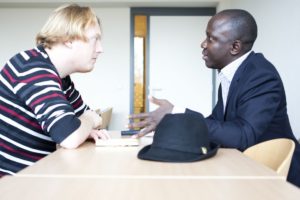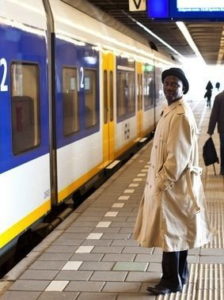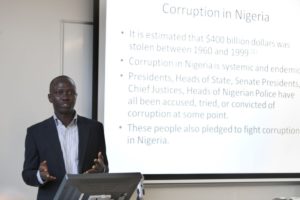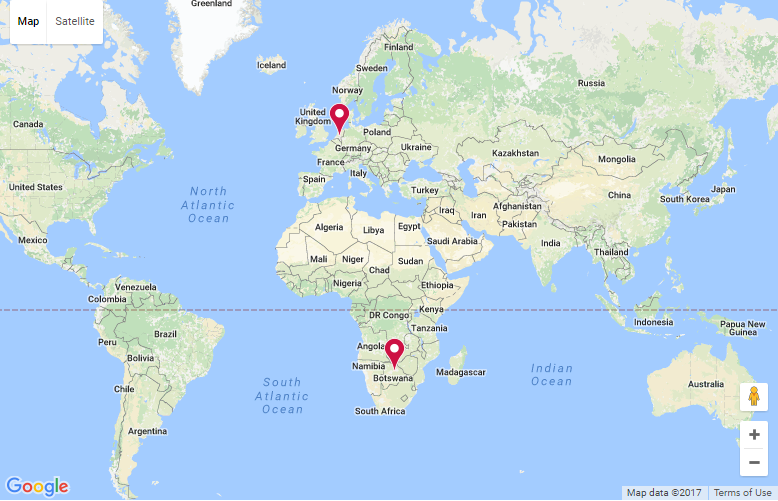Investigative journalism, African innovative voices
Investigative journalism, African innovative voices
When Dutch investigative journalists write an article on Africa from a Dutch perspective, there is always a part of the story that remains in the shadows. African journalists are able to give a full insight in the situation, but hardly have any access to the international media. In Africa itself the infrastructure and media landscape are insufficient, resources are lacking, as is appreciation for investigative journalism. An E-Motive exchange linked African and Dutch journalists. It was between the pan-African FAIR (Forum for African Investigative Reporters) and the Dutch ZAM Magazine. They then wrote articles about Africa together, from different perspectives.
Description
Collaboration between Dutch and African journalists leads to broader view on investigative journalism
When Dutch investigative journalists write an article on Africa from a Dutch perspective, there is always a part of the story that remains in the shadows. African journalists are able to give a full insight in the situation, but hardly have any access to the international media. In Africa itself the infrastructure and media landscape are insufficient, resources are lacking, as is appreciation for investigative journalism. An E-Motive exchange linked African and Dutch journalists. It was between the pan-African FAIR (Forum for African Investigative Reporters) and the Dutch ZAM Magazine. They then wrote articles about Africa together, from different perspectives.
 Better insight in global affairs makes possible better policy
Better insight in global affairs makes possible better policy
Many themes cross borders, such as poverty, migration and food transport. It is therefore not enough to only view them from the perspective of a single country. You need each other, for a broader look and a better insight in what is happening. An example: ZAM did an undercover investigation into human trafficking. It was assumed that victims of human trafficking end up in prostitution, but it turned out that their organs were traded and used in witchcraft. When a problem turns out to be of a different nature, a different policy and approach are necessary.
FAIR supports investigative journalism in Africa
FAIR supports investigative journalists to enable them to create articles and programmes of high investigative and public interest quality. This is necessary because many media in Africa do not give priority to investigative journalism, and hence do not invest in it. It is often difficult to investigate and publish or broadcast stories around controversial topics.
FAIR established a strategic partnership with ZAM Magazine in the Netherlands to develop links between Dutch media and FAIR’s members Idris Akinbajo, Emmanuel Mayah and Kassim Mohamed. These award-winning African investigative journalists became in E-motive exchanges because they wanted to develop access to international media and thus increase the impact of their stories.
“Our own governments tend to listen more when the story comes from outside the country than when it’s just us reporting locally.” Idris Akinbajo
 Results of the exchange in the Netherlands
Results of the exchange in the Netherlands
ZAM Magazine’s vision is to explore and harvest African insights, perceptions and perspectives and present them in the Netherlands and around the world, thereby influencing and creating more balance in Dutch and global debates around black and white, rich and poor, North and South issues. ZAM reports that some progress has been made with regard to realizing that vision.
The Dutch association of investigative journalists, VVOJ, recognized the input of African colleagues by organizing a speech by Idris Akinbajo at its national conference in 2011, and in 2012 a special ‘VVOJ Café’ around African-Dutch co-operation. Akinbajo was also twice invited by the African Studies Centre in Leiden to speak at a meeting on the issue of corruption in government.
Several other Dutch journalists still regularly attend ZAM Newsroom events where they seek to be introduced to the African colleagues who are now often members of FAIR and members of ZAM’s own new ‘News Collective’.
Results in Nigeria en Kenya
His reception and publications in the Netherlands have helped Akinbajo establish his reputation in Nigeria. He now leads a team of 10 investigative journalists in his country. Kassim Mohamed’s reputation has equally risen, to the extent that he is now regularly a guest in the US and other Western countries. Sadly, his grassroots investigative reports have angered the Kenyan government to such an extent that it recently clamped down on the media with restrictive regulations. The international outcry against this, however, was also partly a result of the stellar reputation Mohamed had built.
“Through this exchange I discovered that African colleagues can be interesting sources and suppliers of new perspectives,” Bjinse Dankert.
Method
 Idris was connected to the Dutch journalist Bjinse Dankert, who worked on Nigerian issues and had problems in accessing reliable resources in Nigeria. Together they worked for six weeks on two investigations: one on Shell and oil in Nigeria, and one on migrants’ motivations to come to the Netherlands. This co-creation led to two publications, published in the Netherlands and Nigeria.
Idris was connected to the Dutch journalist Bjinse Dankert, who worked on Nigerian issues and had problems in accessing reliable resources in Nigeria. Together they worked for six weeks on two investigations: one on Shell and oil in Nigeria, and one on migrants’ motivations to come to the Netherlands. This co-creation led to two publications, published in the Netherlands and Nigeria.
Emmanuel Mayah has investigated Nigerian criminal syndicates in the Netherlands and published a major article in the Dutch daily Trouw. Kassim Mohamed engaged NRC’s Mark Schenkel in a debate in ZAM Magazine on the causes of and solutions to piracy in Somalia. Mohamed also researched the situation of Somali refugees in the Netherlands. This story was published on the website of Radio Netherlands and in his own Nairobi Star newspaper. During his visit Emmanuel Mayah also wrote an opinion piece on Shell in Nigeria that was debated on the Dutch Sargasso website and elsewhere on social media.
The publications delved far below the surface. The African and Dutch parties on their own would have written more limited stories. By combining different perspectives, networks and sources, based on mutual trust and respect, nuanced stories emerged with depth and solid facts. Mayah’s story in Trouw was later mentioned as an example of good journalism collaboration –albeit exceptional- by Trouw’s Stevo Akkerman at the Voices of the South Conference.
Later, collaboration between Ivorian, Cameroonian, Ghanaian and Nigerian journalists and Dutch counterparts on the issue of Fair Trade and cocoa was nominated for the prestigious Dutch journalism prize ‘De Tegel’.
Partners

Contact Details
ZAM Magazine
|
Forum for African Investigative Reporters (FAIR)
|
